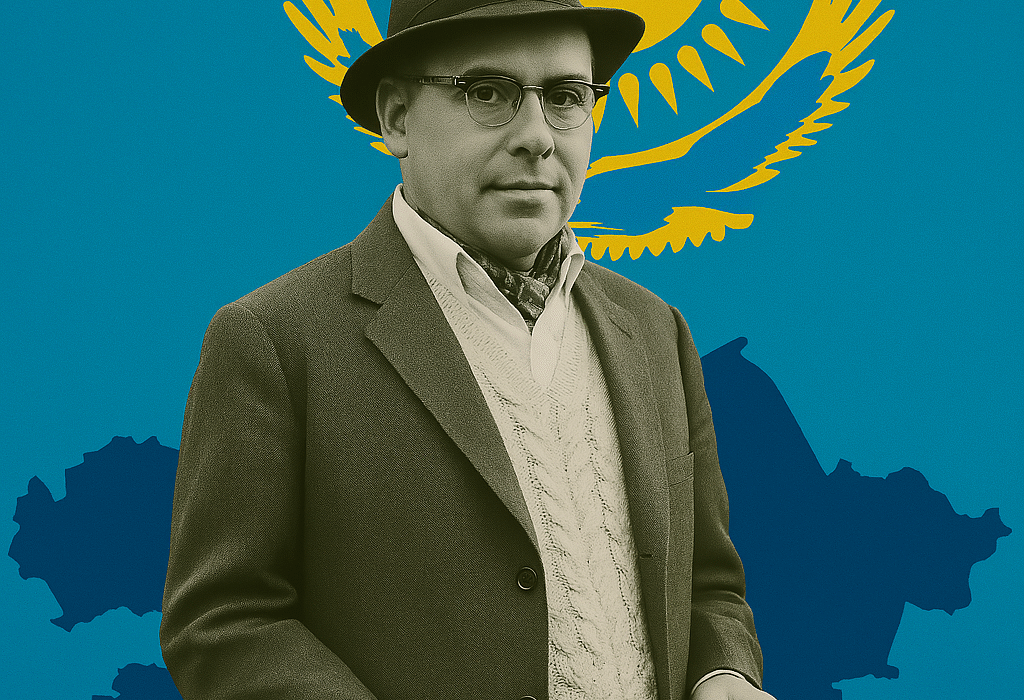by Talgat Kabdygali
As a Kazakh, raised amidst the vast steppes where family, elders, and tradition shape life, I seek ideas that resonate with my culture’s deep-rooted values. In a world of division and cultural flux, I found inspiration in Russell Kirk, the American philosopher who shaped modern conservatism, and Edmund Burke, the 18th-century thinker who championed tradition against revolutionary chaos. Kirk’s 1953 book, The Conservative Mind, traces conservatism from Burke to the 20th century, offering principles like order, tradition, and prudence that echo aspects of my Kazakh heritage (Kirk, 1953). Yet, Kazakhstan’s political and social landscape, shaped by nomadic communalism and post-Soviet authoritarianism, doesn’t fully align with Burkean classical liberalism—a Western framework emphasizing individual liberty and limited government. In this article, I explore Kirk’s and Burke’s ideas, reflect on their partial resonance with Kazakh traditions, and consider their relevance today, drawing on my cultural perspective.
Discovering Kirk and Burke
Growing up in Kazakhstan, I learned to honor Nauryz, our spring festival celebrating community, and to respect elders whose wisdom guides us. When I encountered Russell Kirk (1918–1994), I saw a thinker who valued tradition over upheaval, much like my people. Kirk’s The Conservative Mind countered collectivism with a vision of order, influencing figures like Ronald Reagan (Kirk, 1953). His 1987 Heritage Foundation lecture, “Ten Conservative Principles,” felt like a bridge to my heritage, though filtered through a Western lens (Kirk, 1987). Burke, in Reflections on the Revolution in France (1790), warned against radical change, a caution I recognize in Kazakhstan’s steady modernization (Burke, 1790). Kirk and Burke inspire me, but Kazakhstan’s distinct history demands a careful comparison.
Kirk’s Principles, Burke’s Roots, and Kazakh Echoes
Kirk saw conservatism as a disposition, not an ideology, rooted in timeless truths. Burke argued that societies thrive on inherited wisdom, not revolutionary experiments (Burke, 1790). Kirk’s principles—order, tradition, prudence, and moral responsibility—partially align with Kazakh values, but Kazakhstan’s political culture, blending nomadic communalism with post-Soviet centralization, diverges from Burkean classical liberalism’s focus on individual liberty. Let’s explore four principles and their limited resonance in my culture.
Order: Stability Over Liberty
Kirk believed “order precedes justice and freedom,” echoing Burke’s view of society as a generational contract (Kirk, 1987; Burke, 1790). In Kazakhstan, order is paramount, seen in tribal structures where elders maintain harmony through consensus (Kazakh Culture, 2023). Unlike Burke’s liberal order, which balances individual rights, Kazakh order prioritizes collective stability, often under strong state control. Post-Soviet Kazakhstan’s centralized governance reflects this, diverging from classical liberalism’s limited government ideal.
Tradition: Communal Wisdom
Burke saw tradition as a “partnership” across generations, a view Kirk embraced, quoting Chesterton: “Tradition is the democracy of the dead” (Burke, 1790; Kirk, 1987). In Kazakhstan, traditions like Nauryz and oral epics preserve communal wisdom (Kazakh Culture, 2023). Yet, Kazakh tradition emphasizes collective identity over Burke’s individual-centric heritage. Our nomadic past fosters group survival, not the personal autonomy central to classical liberalism.
Prudence: Cautious Progress
Burke’s prudence opposed reckless reform, a stance Kirk echoed: “The enlightened conservative does not believe that the end justifies the means” (Burke, 1790; Kirk, 1987). Kazakhstan’s gradual modernization under leaders like Nazarbayev reflects this, balancing nomadic heritage with global integration (Kazakhstan Today, 2024). However, this prudence serves state stability, not Burkean liberty. Kazakhstan’s political culture prioritizes control over pluralistic debate, limiting classical liberal expression.
Moral Responsibility: Duty to Community
Burke tied liberty to duty, a view Kirk extended, emphasizing love over materialism (Burke, 1790; Kirk, 1987). In Kazakhstan, konakasy (hospitality) and family loyalty embody duty, binding communities (Kazakh Culture, 2023). This resonates with Kirk, but Kazakh duty is communal, not individualistic. Unlike Burke’s liberal framework, where duty supports personal freedom, Kazakh morality reinforces collective obligations, shaped by nomadic and Soviet legacies.
Kazakhstan’s values echo Kirk and Burke in their respect for stability and tradition, but its political trajectory—marked by post-Soviet authoritarianism and communal ethics—diverges from Burkean classical liberalism, which emphasizes individual rights and limited government.
A Kazakh Perspective on Today’s Challenges
Kirk’s and Burke’s ideas, viewed through my Kazakh lens, offer insights for modern challenges, though their liberal roots don’t fully map onto Kazakhstan’s context.
Globalization threatens local cultures, but Kirk and Burke’s focus on tradition inspires me. In Kazakhstan, dombra music and elder respect preserve our identity (Kazakh Culture, 2023). Yet, our communal traditions clash with classical liberalism’s individualism, making Burke’s framework a partial fit. I strive to protect my heritage, inspired by Kirk’s reverence for the past.
In a polarized world, Burke and Kirk’s prudence calls for dialogue (Burke, 1790; Kirk, 1987). Kazakhstan’s interethnic harmony, rooted in tribal consensus, aligns with this (Kazakhstan Today, 2024). However, our political culture limits open debate, unlike Burke’s liberal pluralism. As a Kazakh, I value consensus but yearn for broader discourse.
Kirk and Burke distrusted centralized power (Burke, 1790; Kirk, 1987). Kazakhstan’s tribal governance, where local leaders resolve disputes, reflects localism (Kazakh Culture, 2023). Yet, our state’s strong control contrasts with Burkean limited government. I admire Kirk’s balance but recognize Kazakhstan’s distinct path.
As a Kazakh, I find Kirk’s and Burke’s conservatism—order, tradition, prudence, duty—partially reflected in my heritage. Kazakhstan’s communal values and post-Soviet stability align with their call for order and tradition but diverge from Burkean classical liberalism’s individual liberty. Inspired by Kirk and Burke, I aim to preserve my culture’s wisdom while navigating a modern world.

